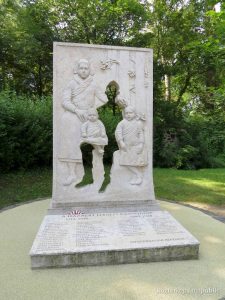Widgetized Section
Go to Admin » Appearance » Widgets » and move Gabfire Widget: Social into that MastheadOverlay zone
The Forgotten Meaning of Memorial Day
The views expressed are those of the author and do not necessarily reflect the views of ASPA as an organization.
By Thomas E. Poulin
May 12, 2025

In the United States, Memorial Day falls in late May. On that day, we are asked to remember those men and women who died in service to our country. Other nations have their own holidays set aside, designated to be quiet days of somber reflection and remembrance, not as public celebrations. On these days, the military conducts ceremonies and services to honor those who have fallen.
These ceremonies are not restricted solely to recognized heroes such as those awarded the Medal of Honor or other awards for valor. The military recognizes that not all acts of courage are acknowledged or reported. No doubt many died deserving medals, but with no one to report their bravery, their courage was forgotten. The military also recognizes that not all who die during service were engaged directly against the enemy. They might have died during support operations, from an accident, or been killed during the initial stages of an attack, never knowing what happened. To loosely paraphrase Edward J. Croaker, a 19th-century Chief of the Fire Department of New York: “They knew some would be injured and that some would die. Enlisting was their act of courage, and after that, it was all in the line of duty.”
It might seem that these ceremonies are by the military for the military, but that is only one meaning of Memorial Day. They are honoring not only fellow service members but fallen friends. As World War I closed, Great Britain began to cope with the reality of those missing and presumed dead during the long years of war. Some had crashed during flights in remote areas and were never found. Some were lost at sea. Others vanished in the chaos of land battles, with their remains destroyed or unidentified. In many cases, no one could tell the family and friends who remained how an individual had perished. With no means for closure, their pain would linger and their wounds would never heal.
Recognizing this, a British military chaplain, David Railton, proposed the creation of The Unknown Warrior, an idea quickly embraced by the British military and the public. The remains of an unidentifiable warrior would be selected. The service branch of the deceased would never be known. The Unknown Warrior represented then and now all those who had fallen in service to their country, giving what Abraham Lincoln referred to as “…the last full measure of devotion…” Family and friends would have an individual tomb to visit, where flowers could be laid and prayers might be made. This would help them achieve closure, never forgetting the fallen but allowing them to move on with their lives, as those fallen family members and friends would have wished.
One of the most moving monuments in this regard is Hungarian sculptor Böjte Horváth István’s memorial to those who died in both world wars. The imagery portrays a family surrounding a gap, the gap representing the missing family member or friend. The poignancy of the message is the hole that is left in the lives of those who remain—a hole that will never truly be filled. Each Memorial Day, we must remember those who have fallen, but we should never forget that each individual death during service ripples out through the community.
We must remember those who died, but we must also remember those who sacrificed family and friends, and whose pain might still linger years or decades later. In his song for Canadian Remembrance Day, Canadian singer Terry Kelly wrote:
Read the letters and poems of the heroes at home
They have casualties, battles, and fears of their own
There’s a price to be paid if you go, if you stay
Freedom’s fought for and won in numerous ways.
Men and women have served, still serve, and shall serve our nation in uniform. Over time, there shall be those who die during their service, and Memorial Day is set aside to remember them. We owe them at least that. But never forget the other meaning of Memorial Day—remember those who lost family and friends in service to a cause greater than themselves. Remembering the parents, siblings, spouses, children, and friends left forever with a hole in their lives is another way of honoring the sacrifices of the fallen.
Author: Thomas E. Poulin, PhD, SHRM-CP, PSHRA-CP is a training and development consultant and independent scholar. He served in local government for over 30 years, and has been teaching and consulting at the graduate level since 2004. He served two terms as President of the Hampton Roads Chapter of ASPA. He may be reached at [email protected]


Follow Us!